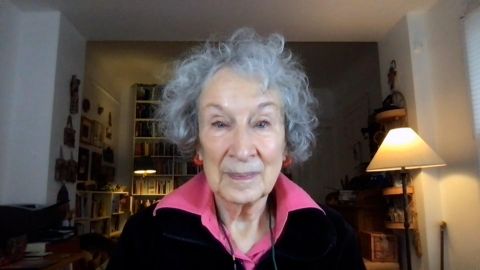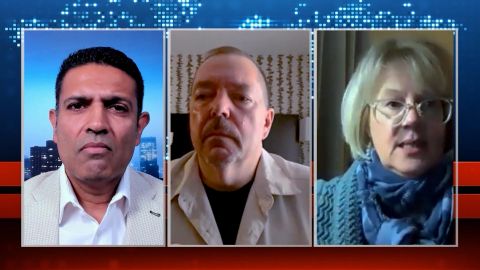Read Transcript EXPAND
CHRISTIANE AMANPOUR: Next, we look at the opioid epidemic in the United States. As the country reached 100,000 drug overdose deaths in the most recent 12 month period, those demanding accountability have rallied outside the Department of Justice. One of them was Ed Bisch. Since losing his son to OxyContin overdose in 2001, he’s turned to activism and founded Relatives against Purdue Pharma. That’s the maker of the addictive painkiller, which was owned by the Sackler family. He’s been speaking with Hari Sreenivasan about this campaign along side the author of “Dopesick,” Beth Macy.
(BEGIN VIDEOTAPE)
HARI SREENIVASAN: Christiane, thanks. Ed Bisch, Beth Macy, thank you both for joining us. Beth Macy, you have chronicled this national tragedy in both “Dopesick” and now on Hulu and other places. And here is a father in his grief, like Ed, like so many other parents and family members throughout the country, impacted so personally and tragically by this epidemic. And give us an some perspective here.
BETH MACY, AUTHOR: At the rally on Friday, we had two former federal prosecutors. When’s the last time you saw federal prosecutors protest in front of the Department of Justice? You had the former head of the fraud unit. You had the person who’s portrayed in the Hulu series. He spent five years of his life. He wrote the 120-page memo. And, you know, just, we just reached the threshold of 100,000 deaths annually a few weeks past, right? And Ed gathered us all for the rally on Friday. We all stayed in the same hotel. And that morning, the janitor was saying, what are you here for? And then he burst into tears because he had lost two relatives 18 years ago to OxyContin. Think about that. What crime can you name in the nation that has killed more people and has left fewer families touched? We now a third of American families have experienced an opioid addiction and the overdose crisis. And like, what more evidence is it going to take? It’s just so frustrating that we seem to have one justice system for the guy who he used to work with at Subway who’s still in jail because he sold some weed. And billionaires who, recidivist billionaires, by the way, pled guilty in ’07, again in 2020 and then slid in through the bankruptcy era and the profits sliding through on a loophole to get away a third time. And when you see the families, like Ed, who was leading the charge at the front of the rally in 2007, with a photo of his son, Ed. On Friday, he had the same exact photo and it now has yellow tape on it and I just think it’s time for America to listen to them.
SREENIVASAN: Ed, when people look at the headlines in the past few weeks, they’re going to say, oh, well, looks like there’s a big settlement. The victims will be compensated. Why is that not enough for you?
ED BISCH, RELATIVES AGAINST PURDUE PHARMA: Well, the headlines are wrong. They’re very misleading. Number one, this is under appeal. So it’s not a done deal. Number two, the victims are getting less than the lawyers. The victims’ average payout will be $5,000, OK, not enough to cover.
(CROSSTALK)
MACY: — funeral expenses.
BISCH: The top payout is $48,000, minus your lawyer fees and expenses. And very few people are going to get that. So like I say, the average payout, $5,000, it’s a sad joke, it really is. I’ve called that a bankruptcy scam from day one. And the whole point of it was to give the Sacklers immunity. While there’s more and more people and they make it confusing on purpose. Well, that’s more and more people learning what it’s all about. And it seems like this appeal judge realizes what it’s really about and, hopefully, she makes the correct decision. And they have made a mockery of the U.S. justice system. Now they’re making a mockery of the U.S. bankruptcy system, so much that there’s two separate bills in Congress, which, unfortunately, are too late to stop them but inspired by their misdeeds.
SREENIVASAN: Beth Macy, these flaws that he’s talking about, that are structural, both in the bankruptcy system and the justice system, what led to this situation, where we have the heads of these companies or this family, are able to walk away so far without any personal liability? Is it that they, as a company, have paid large amounts, whether it’s to lawyers or whether it’s to victims? You know, oftentimes in white collar crimes, we get to hear that phrase, they will do so without admitting any wrongdoing. But in these cases, as you pointed out, there have been losses that the company has had to admit to.
MACY: OK. So they have agreed to pay $4.5 billion and give up the keys to the company in exchange for full civil immunity. But right before they filed for bankruptcy, they strategically drained more than $10 billion. And if you take that $4.5 billion they’re supposedly going to pay over nine years and figure in investments, they’re going to walk away from the settlement, if it goes as is, as wealthy as they are right now. And that’s why Ed and all the other families of the dead are so upset about this.
SREENIVASAN: Ed, I want to ask a little bit about your son and what prompted you to become so fervent in trying to gather information and becoming an advocate for other victims of opioids.
BISCH: My son died in February 2001. The very first time I heard the word “OxyContin,” my son was laying in his bed, dead from it, the first time I heard the word. So I started educating myself and, as I learned more and more and as the deaths grew more and more, I started a website, just to warn kids about, you know, don’t use OxyContin, it will kill you. Well, through this website, I started getting emails from parents all over the country. And as we learned more and more how this company was lying, like saying less than 1 percent of patients get addicted and they were propping up pain words, as I’ve learned that, parents would say, what can we do? What can we do? So we decided to do a protest in 2003 in Orlando, Florida, at one of their lavish doctor seminars. And they said, oh, what are we going to call ourselves? And we came up with RAPP, R-A-P-P, Relatives against Purdue Pharma. And now today, there’s thousands and thousands of us. Because anyone who ever stood up to Purdue Pharma, whoever spoke out, they’re a member of RAPP. And I was proud we had close to 200 of them there at the rally on Friday. And it was a moving ceremony.
SREENIVASAN: Beth, one of the things that Ed mentioned that stood out to me, is that phrase, less than 1 percent of people get addicted. When you watch the “Dopesick” on Hulu or read your book, you find the origin story of where that statistic came from. And then there’s almost an entire lexicon, a vocabulary, phrases or pseudoaddiction. All this comes down to messaging and marketing and a skillful way, again, separate from the outcome. But it was unbelievable how systematic it was that we, in America, have changed the conversation around pain, partly due to the interests of more sales of this specific drug.
MACY: Right. It was Arthur Sackler, Marketing 101, you know, he is the uncle of Richard Sackler. And he turned Valium into mother’s little helper, the first billion dollar drug in American history. And Arthur and his relatives and cohorts used those techniques to flip the narrative. For 100 years, we had a huge opioid crisis after the Civil War. Morphine, doctors would just leave morphine and syringes with people and say, “Use as needed.” Well, after that, it became a huge epidemic. The government really cracked down. What Richard Sackler managed to do, using his uncle’s marketing strategies, was to flip the narrative to say, OxyContin is safe and less than 1 percent of cases. And they just diabolical targeted these communities and the most neglected people in America, the most vulnerable people. And then they stigmatized them and blamed them for the addictions that they were partially responsible for. We’ve got to get over this idea that all drug users are bad, that — I mean, it was so moving to be able to be with all those families on Friday, because people would come up to say, “We saw your show, we read your book and, all of a sudden, I understand what my son went through. My son’s dead but now I finally understand.” These people desperately want to get better. It’s just they need help and we’re not providing that help at the scale to match the scale of the epidemic.
SREENIVASAN: So, Ed, from the rally this last week, was there something new for you?
BISCH: Yes, during the rally, I got an email from our pro bono lawyer, Michael Quinn, of the ad hoc committee accountability saying that the DOJ has reached out to him. And they have read our letter that we sent. And he is trying to set up a meeting for this week, where we get to voice our concerns. And you know, it’s a start. It’s further than we’ve gotten before.
SREENIVASAN: Do you have a specific ask for them, exactly what it is that you want them to do?
BISCH: The DOJ has enough evidence to prosecute. And that’s what we’re asking, review the evidence. Do your job.
SREENIVASAN: Beth, what do you think the likelihood is of Ed’s wish here?
MACY: So I’m a little hopeful. But should we — should Ed here have to be making noise now for more years than his son, who was 18 when he passed, was actually alive? I mean, this man has been through it. And I was also really buoyed Friday by the fact that we had two career prosecutors, including one who used to work at the DOJ. The evidence is all there. It’s all beautifully laid out before them. We just need people to have some courage so that there aren’t two forms of justice, one for billionaires and one for all the rest of us.
SREENIVASAN: Besides the case that’s been made in the court of public opinion, I mean, we had recently the attorney general in Massachusetts, saying that, from what she’s seen, she’s publicly asked that the DOJ should bring charges against the Sacklers. Do you think that’s likely to happen, Beth?
MACY: I don’t want to count this group out, man. I would not want to go against Ed Bisch. He’s not giving up. Nan Golden (ph) is not giving up. Nor are the 300 parents we had out there on Friday. And they’re doing what’s right. The Justice’s Department’s job is to make sure the law has been followed. Purdue Pharma is recidivist criminals. They have been found guilty in ’07 and again in 2020 and now they’re skating out through some loophole of the bankruptcy. And they’re going to come out richer than they were. And that is just not right. It’s so simple, if you just lay out the facts and look at them.
SREENIVASAN: Beth Macy. Ed Bisch, thank you both for joining us.
MACY: Thank you so much, Hari.
About This Episode EXPAND
President Biden warns President Putin not to invade Ukraine. Margaret Atwood’s latest project takes a turn, with a focus on utopian ideals and how we might do better. In April, America reached a record 12-month high of 100,000 deaths by drug overdose. 200 protesters rallied outside the Department of Justice to demand prosecution of the Sackler family.
LEARN MORE

